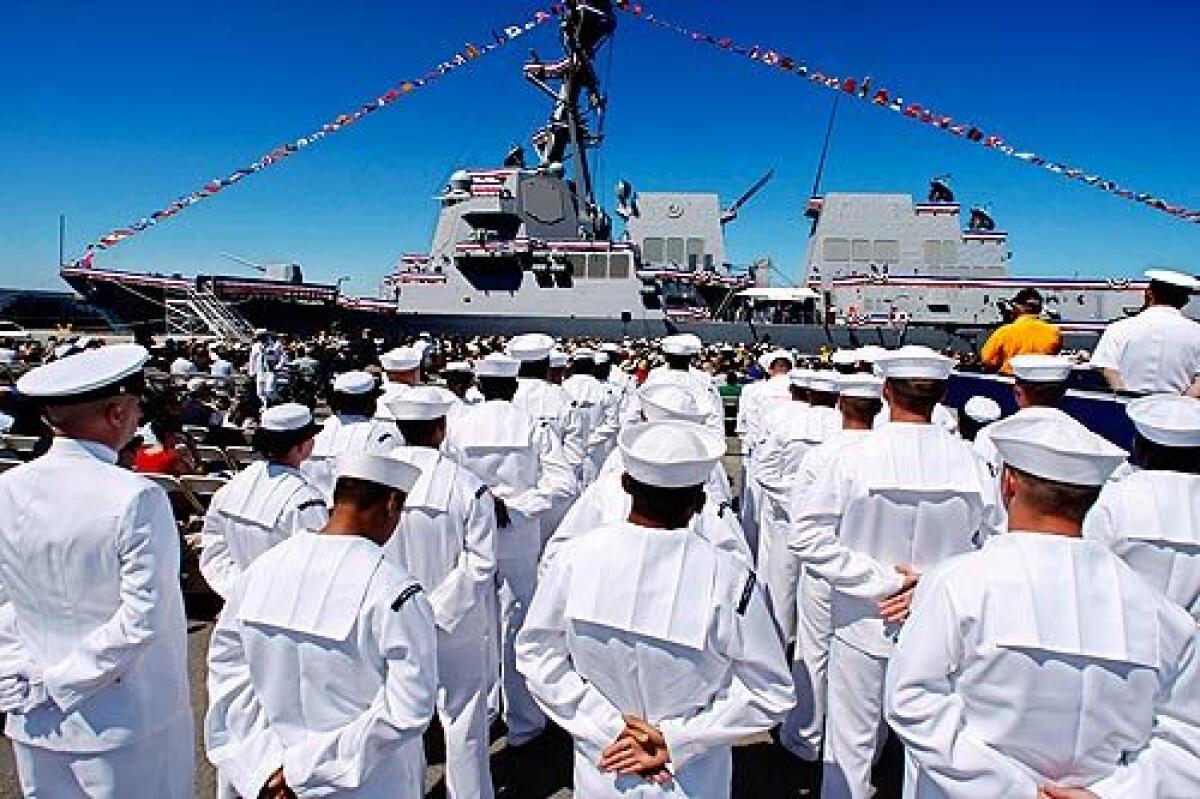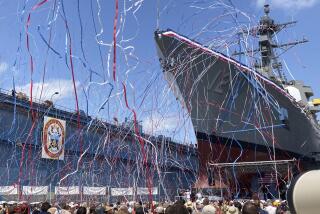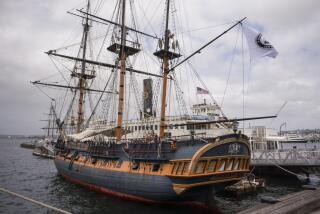Navy commissions ship to honor Stockdale

As dozens of former POWs snapped to attention, the Navy on Saturday dedicated a warship to the late Vice Adm. James Stockdale, who was credited by many fellow captives in Vietnam with giving them the courage to survive.
FOR THE RECORD:
Naval ceremony: A photo caption on an article in Sunday’s Section A said that sailors at the commissioning of the warship Stockdale were standing at attention. They were at parade rest. —
Stockdale, a soft-spoken scholar best known for his short-lived foray into presidential politics, died at 81 in 2005. He was H. Ross Perot’s running mate in 1992 -- but Perot, who spoke at the commissioning, did not mention the campaign. Instead he focused on Stockdale’s ability to inspire prisoners in the infamous North Vietnamese prison camp known as the Hanoi Hilton.
In a ceremony laden with Navy traditions more than two centuries old, dignitaries at a podium on the bunting-draped Stockdale spoke to a crowd of several thousand gathered on a concrete dock at Naval Base Ventura County. It was the official debut of the Stockdale, a 509-foot-long guided missile destroyer that will be based in San Diego.
In his familiar, high-pitched Texas twang, Perot spoke of Stockdale defying his captors in organizing a worship service at the Hoa Lo prison camp, where he was held in solitary confinement for four of his seven and a half years. When furious guards broke up the service, Stockdale was among the men who risked their lives by singing “The Star-Spangled Banner.”
With that tale of Stockdale’s resistance to crushing pressures from prison officials, Perot urged the crowd to give their all as a Navy band launched into the national anthem.
“I hope you just sing your hearts out today,” he said.
Stockdale, who received the Medal of Honor for his valor in prison, became a national figure when he reluctantly accepted the No. 2 spot on Perot’s independent ticket in 1992. At the vice presidential debate, he appeared unprepared and confused, an impression that deepened when he asked: “Who am I? Why am I here?” He later explained that he meant for the rhetorical questions to define him as a philosopher, but they instantly became a national punch line indicating a kind of genial cluelessness.
By all accounts, he was brilliant. A Naval Academy graduate who studied philosophy at Stanford, he was an avid follower of the Stoics, ancient Greeks who taught that free will enables people to rise over the most adverse circumstances. It was an ethos that proved invaluable in prison, where his shoulders were wrenched from their sockets, his knee was broken twice, he was forced to wear leg irons for two years, and he was tortured at least 15 times.
Charlie Plumb, a former prisoner of war who helped organize the ceremony, said in an interview that Stockdale encouraged others by spreading the ideas of the philosopher Epictetus, secretly disseminating them on sheets of toilet paper in an ink he made from brick dust. Plumb said the effort helped men overcome their shame for buckling under torture.
The most senior naval officer at a camp whose prisoners included John McCain, Stockdale confided that he too hadn’t been as strong as he wanted to be, according to Plumb. “But he said, ‘Here’s the deal,’ ” recalled Plumb, now a motivational speaker. “ ‘You back off, regroup, get a second line of defense and go back into the torture room with a renewed commitment to be stronger the second time around.’ ”
Stockdale also organized a clandestine communication system, linking prisoners through coded coughs, sneezes, taps on cell walls, the whisking of straw brooms, any sound likely to go unnoticed by the guards.
Especially for prisoners who had spent months in isolation, it was more than just a way to convey data.
“It was a form of validation,” Plumb said. “You knew someone was out there who knew you were alive.”
At Saturday’s commissioning, the Stockdale’s commanding officer addressed the vice admiral’s family.
“Thank you for sharing your husband, your father, your grandfather with our ship and our nation,” said Cmdr. Fred W. Kacher. “We are better off for it.”
In a wheelchair, Sybil Stockdale, a crusader for POWs at a time when the government preferred silence on the issue, was helped to the podium by her granddaughter Elizabeth, a teacher at a Virginia private school. It was Elizabeth who issued the traditional order -- one that got sailors sprinting through the crowd and onto the decks as guns fired, engines churned, sirens blared, radar dishes whirled and four jets roared overhead.
“Man this ship,” she cried, “and bring her to life!”
More to Read
Sign up for Essential California
The most important California stories and recommendations in your inbox every morning.
You may occasionally receive promotional content from the Los Angeles Times.











